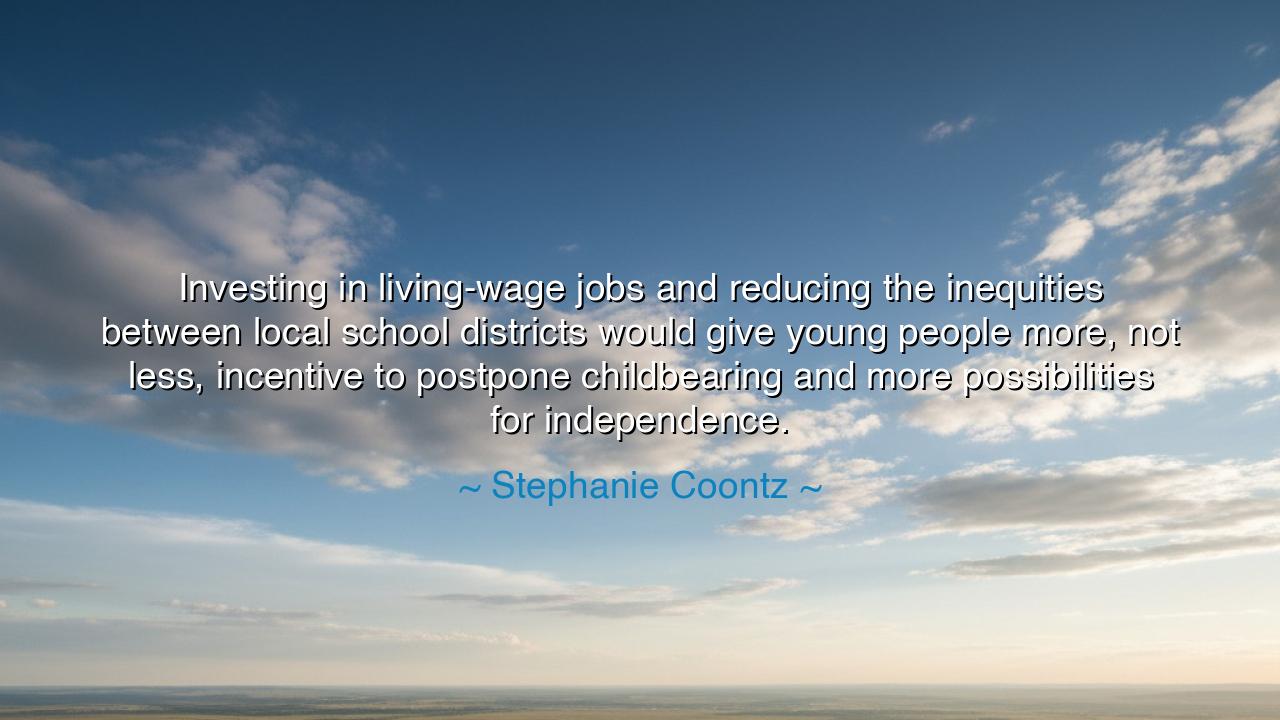
Investing in living-wage jobs and reducing the inequities between
Investing in living-wage jobs and reducing the inequities between local school districts would give young people more, not less, incentive to postpone childbearing and more possibilities for independence.






The words of Stephanie Coontz, when she declared, “Investing in living-wage jobs and reducing the inequities between local school districts would give young people more, not less, incentive to postpone childbearing and more possibilities for independence,” are not merely a call for policy — they are a summons to moral vision. In them echoes the voice of one who sees beyond statistics and legislation, into the beating heart of society itself. She speaks of justice, of opportunity, and of independence — not as gifts bestowed from above, but as rights that must be nurtured in every generation. Her words carry the wisdom of one who knows that freedom is not born of chance, but of structure; not of privilege, but of fairness.
In this declaration, Coontz unveils an eternal truth: that economic independence is the foundation upon which all other freedoms rest. To offer a person dignity, you must first offer them the means to sustain themselves — to labor without exploitation, to learn without limitation. The living wage she speaks of is not merely a number, but a symbol — the acknowledgment that every worker deserves not only survival, but stability. When society invests in fair wages and equal education, it plants the seeds of hope, discipline, and self-determination. These are the virtues that give rise to true independence — the freedom to choose one’s path, to delay or pursue parenthood not from desperation, but from deliberate will.
Her words also reveal the deep connection between inequality and the choices young people make. When schools in one neighborhood gleam with opportunity while those in another crumble from neglect, it is not fate — it is failure. When some youth see before them the horizon of possibility, while others see only walls, the result is not coincidence — it is consequence. Coontz reminds us that the decisions of the young are not born in isolation, but shaped by the soil in which they grow. If we wish them to dream higher, to build later, to choose wisely, we must first give them a world that makes such wisdom possible.
History itself bears witness to this truth. Consider the New Deal era of the 1930s, when the United States rose from the ashes of the Great Depression. When leaders invested in public works, education, and fair labor standards, they did not simply rebuild roads — they rebuilt lives. Young people, given access to stable work and schools of quality, began to believe in futures beyond survival. The result was not only economic growth but a flowering of independence — a generation that could plan families when ready, that could dream not in the language of scarcity but in the poetry of possibility. Thus, Coontz’s vision is not theory; it is the echo of history’s proven wisdom.
And yet, her message is not confined to economics alone. It carries a moral weight that transcends policy. For she speaks to the responsibility of a society to nurture its youth — to give them not only bread but purpose, not only education but equity. A society that denies these things breeds despair and dependency; a society that provides them fosters freedom and foresight. Independence, in her view, is not a solitary triumph — it is a collective achievement, a covenant between the generations. It is the promise that we will not ask our youth to rise while we keep their ladders broken.
The ancients, too, understood this principle in their own way. The philosopher Aristotle taught that a just society must provide conditions where every citizen can pursue the good life — not luxury, but dignity. He would have recognized in Coontz’s words the same moral architecture: that the freedom of the individual depends upon the fairness of the polis. Where there is inequity, there can be no harmony; where there is injustice, there can be no independence. The wealth of the few cannot outweigh the impoverishment of the many without corroding the spirit of the whole.
So, O listener, let this teaching take root within you: that independence is not merely the privilege of those who have, but the right of all who strive. If we wish to see young people rise — to make wise choices, to grow into strength, to build families and futures grounded in stability — we must first give them the tools of equality. Support fair wages, invest in schools, uplift the forgotten. See in every worker the spark of dignity, in every student the seed of greatness. The promise of tomorrow begins not in commands to behave differently, but in the courage to build differently.
Thus, the wisdom of Stephanie Coontz endures like a flame passed down through generations: that justice creates freedom, and freedom, in turn, creates responsibility. To invest in people is to invest in the strength of a nation’s soul. The independence she speaks of is not mere self-sufficiency — it is the harmony of a society where every person, through fairness and opportunity, can choose their own destiny. Let us therefore act not as spectators of inequity, but as builders of justice, that every child may inherit not just a country, but a chance.






AAdministratorAdministrator
Welcome, honored guests. Please leave a comment, we will respond soon